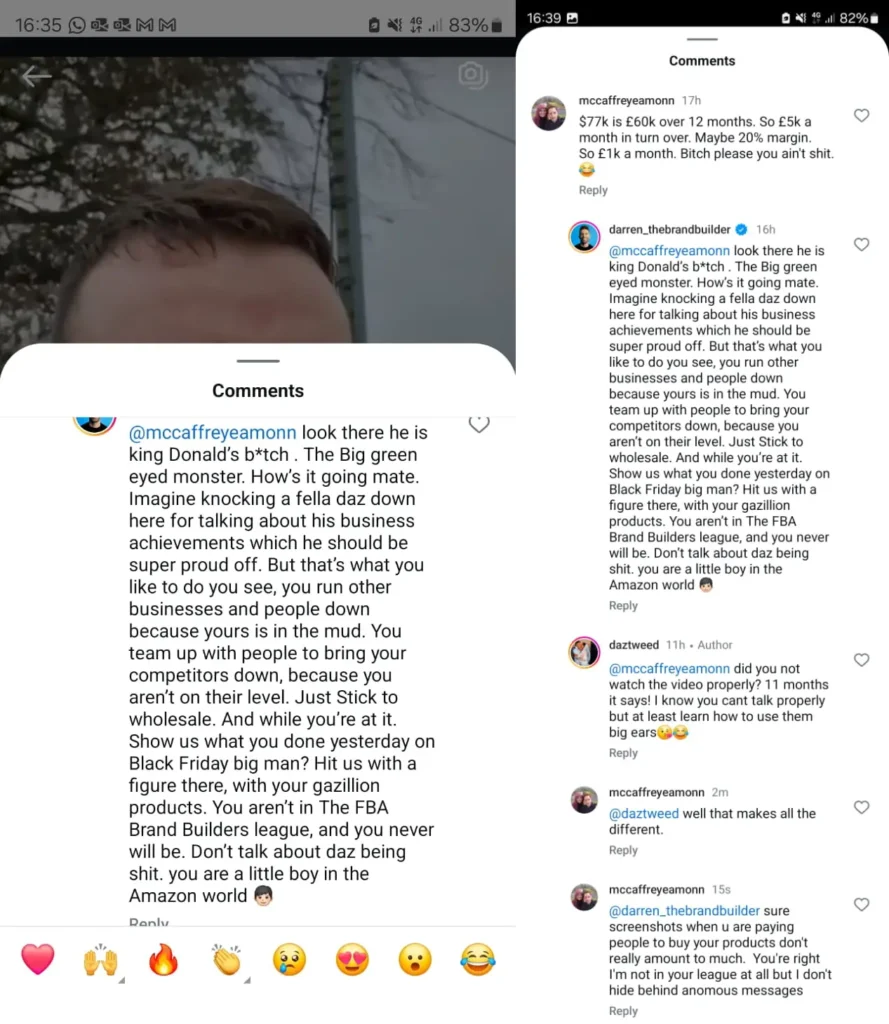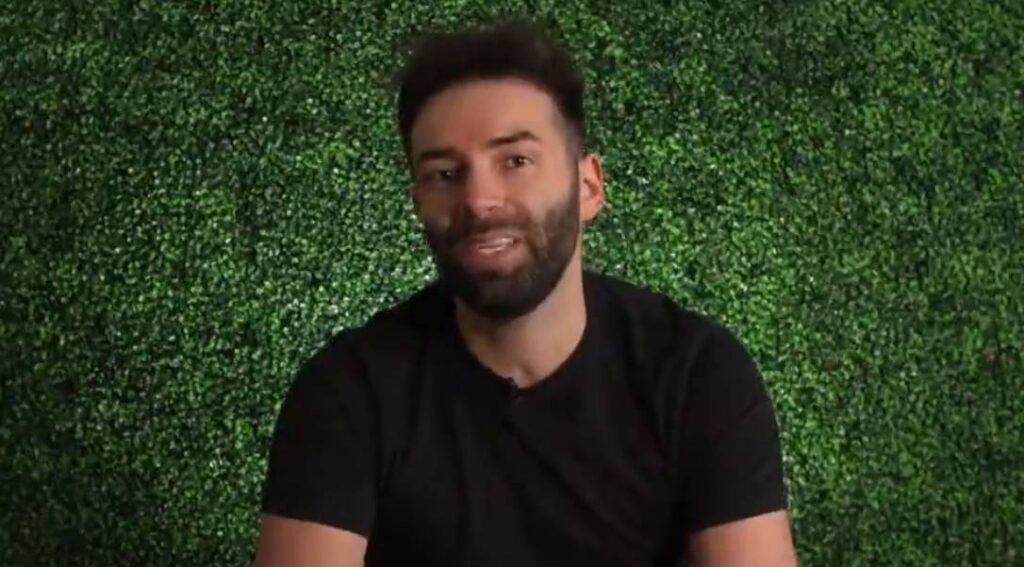Building a brand isn’t just about catchy slogans or slick marketing campaigns. It’s about staying true to your values and maintaining professionalism, no matter the setting. Recently, interactions between Darren Campbell, founder of The FBA Brand Builder program, and his competitor, Eamonn, have drawn attention to how easily those principles can slip.
A TikTok video by Darren and an email exchange with our team shed light on some of the gaps in consistency and professionalism—an issue that could erode trust in their respective brands.
Public Image vs. Private Actions
This week offered a clear glimpse into the high-stakes nature of the Amazon FBA coaching world.
On TikTok, Darren alluded to individuals, including Kirsty, that he suspects are connected to this website. Meanwhile, a public social media exchange between Darren and Eamonn raised eyebrows about how competitors interact in such a competitive industry.
Adding to the mix, Darren sent an email to our team requesting a “truce,” attempting to soften his critics by presenting himself as open to feedback. However, the contradictions between his public and private messaging raise serious questions.

The Social Media Scuffle
Darren posted on social media about Daz Tweed's (FBABB team member) success story, and Eamonn took the opportunity to publicly comment, correcting his math. It wasn’t long before Darren fired back, providing an unvarnished look at how these two competitors engage outside their programs.
Sure, Eamonn’s correction may have been accurate, but calling it out directly on Darren’s post came across as unnecessary and possibly opportunistic. These interactions can come off as unprofessional and risk damaging the credibility of both parties.
At the same time, Darren didn’t exactly seize the high ground. For someone leading a business that claims to be “the biggest brand-building company in the world,” he could have handled the moment with more grace. Instead, the exchange highlighted cracks in the polished image Darren works so hard to project.

Darren Campbell: Contradictions Between Public and Private Messages
Darren’s online persona leans heavily on motivational messages and success imagery—Lamborghinis, Dubai vacations, and bold declarations like:
"Your time of success and your growth as a person is going to f*** a lot of people off... Don’t ever shrink yourself to feel comfortable around low-level thinking people."
"You have to go the whole f***ing way and never give up. I promise you if you do that, you will go the whole way."
These posts paint a picture of resilience and ambition, but the reality experienced by some clients doesn’t always align. Many have reported financial losses, hidden costs, and struggles to get refunds.
Contrast that with the email Darren sent to our team, which struck a much humbler tone:
“We’re still in the early stages of our journey, less than two years to be exact, and I fully accept that we’ve made some mistakes along the way.”
“As the Founder & CEO, it’s my responsibility to lead with transparency and humility, and I will always do that to the best of my ability.”
While his words seem genuine, they don’t address deeper concerns about accountability, including the specific grievances raised by clients. The email also feels at odds with his more combative TikTok presence.

Eamonn’s Role: A Missed Opportunity
Eamonn isn’t off the hook either. By choosing to publicly critique Darren’s and Daz Tweed's math, he distracted from his own message and risked looking petty. Even if his point was valid, the method of delivery came across as reactive and unprofessional.
What Eamonn Could Have Done Differently:
- Create Independent Content: Instead of engaging publicly, Eamonn could have addressed the issue on his own platform, using it as a chance to establish authority.
- Stay Above the Fray: By not getting drawn into disputes, he could have projected professionalism and calm—a better look for someone trying to build trust.
Lessons for Darren and Eamonn
Both Darren and Eamonn have clear opportunities to fine-tune their approaches to brand building and professionalism:
1. Stay Consistent
- Darren: Align your motivational messaging with how you handle client concerns. Saying one thing and doing another will only hurt your credibility.
- Eamonn: Ensure that all your public actions reflect confidence in your brand rather than engaging in reactive behavior.
2. Be Transparent
- Darren: Share clear data about client results—profitability, costs, and success stories. Transparency builds trust.
- Eamonn: Highlight the strengths of your program and let your success speak for itself.
3. Lead by Example
- Darren: Show resilience and integrity in every interaction, especially during tough times.
- Eamonn: Focus on showcasing expertise and thought leadership without getting dragged into disputes.
4. Focus on Clients
- Darren: Shift your energy to providing practical, actionable support for clients instead of overemphasizing motivational soundbites.
- Eamonn: Invest in tools and guidance that set your clients up for long-term success.
5. Keep Disputes Private
- Both: Avoid airing disagreements publicly. It does nothing to build trust and only distracts from your shared goal of helping clients succeed.

The Verdict: Professionalism or Posturing?
This week’s events highlight a key truth: professionalism and consistency are non-negotiable in brand building. Darren’s motivational persona, defensive videos, and carefully worded email reveal a disconnect that clients are starting to notice. Eamonn’s decision to engage publicly showed how even valid points can be overshadowed by poor delivery.
If these two leaders want to stay competitive, they need to prioritize trust, transparency, and client-focused action. The Amazon FBA coaching space thrives on integrity, and the ones who uphold it will be the ones who win in the long run.
That said, we welcome both Darren and Eamonn to pitch their cases for the truth and the success of their programs in a transparent and professional manner. If either party can present clear facts and data—profitability rates, client outcomes, or any other verifiable results—we’ll publish it unedited. However, if it’s just more of the same posturing and inconsistency we’ve seen this week, we strongly suggest clients look elsewhere for mentorship.
And let’s be honest—if you’re looking to learn about building a brand, it might be worth seeking guidance from someone who isn’t prone to emotionally driven, petty attacks. A great mentor teaches by example, and professionalism speaks louder than any flashy TikTok video or snarky comment ever could.
When Donald Duck has to step in to ask two grown businessmen to act professional… well, Jesus.

